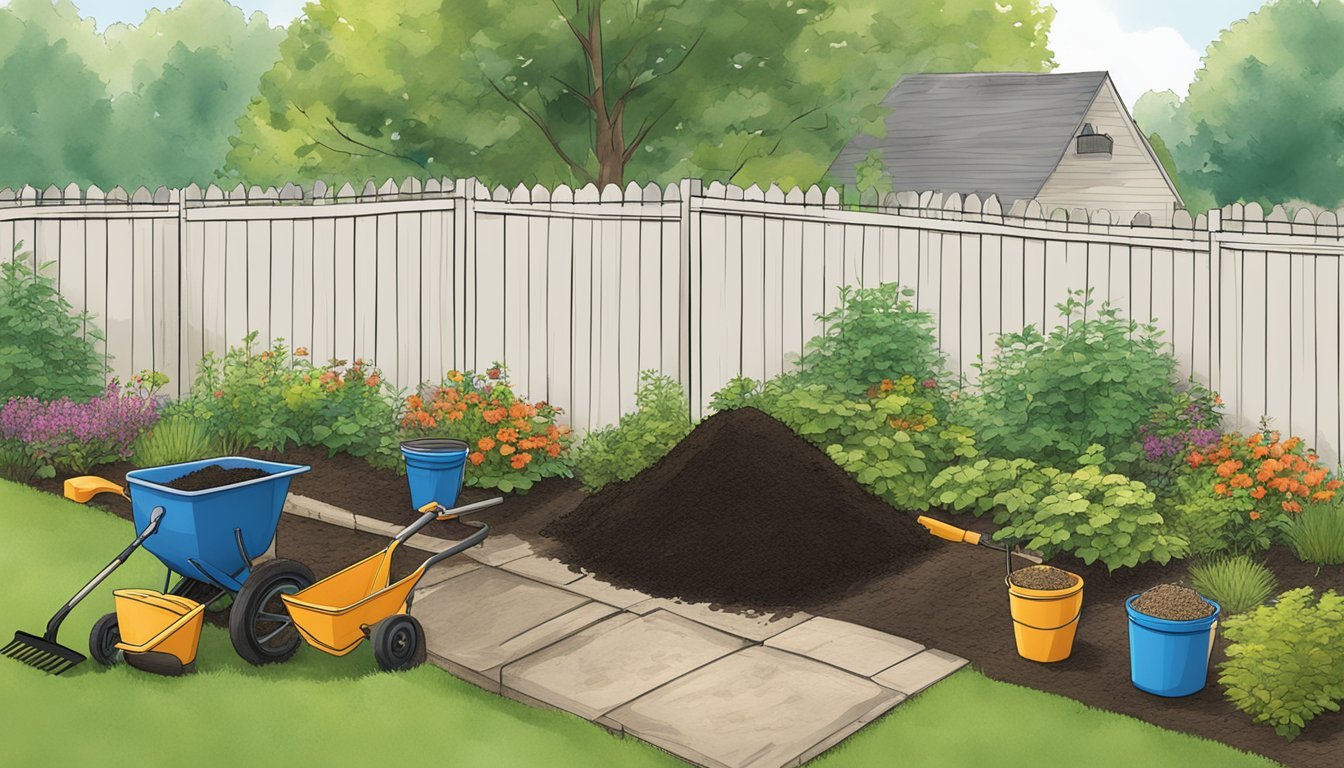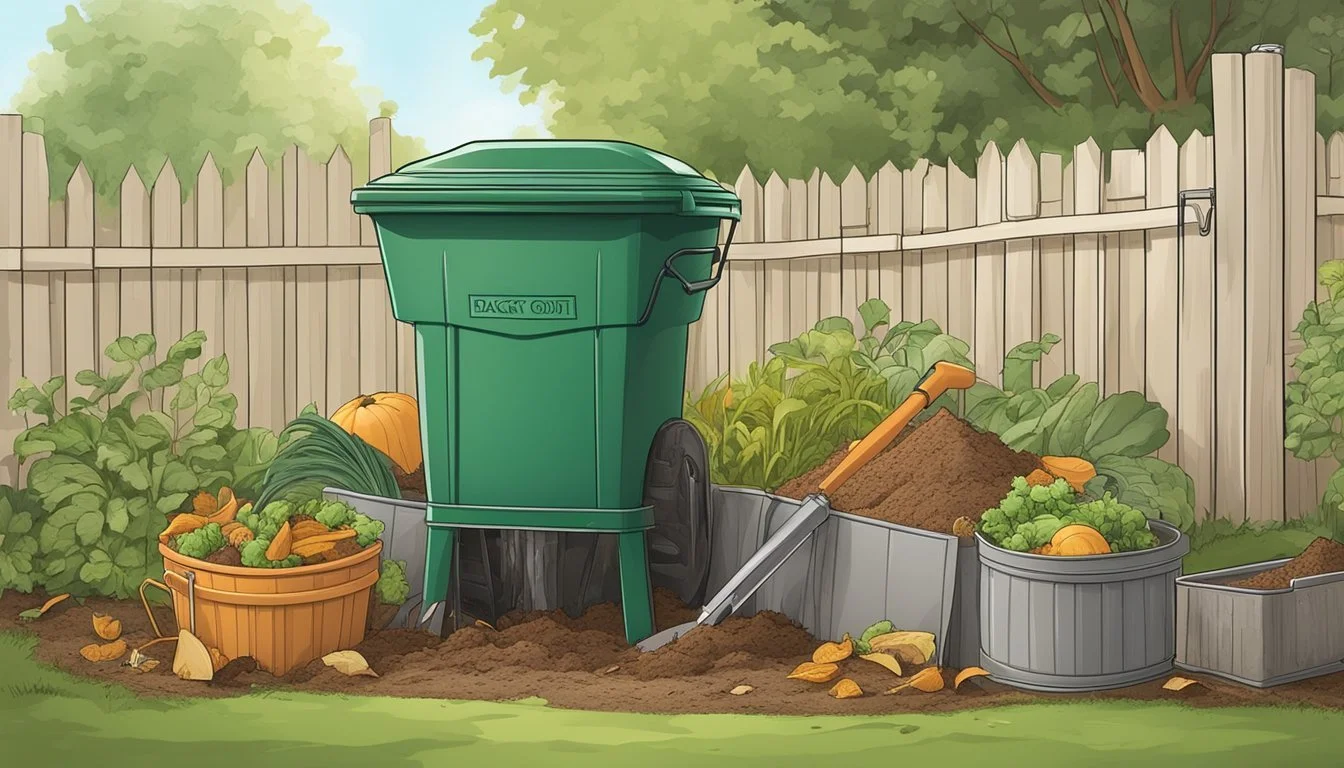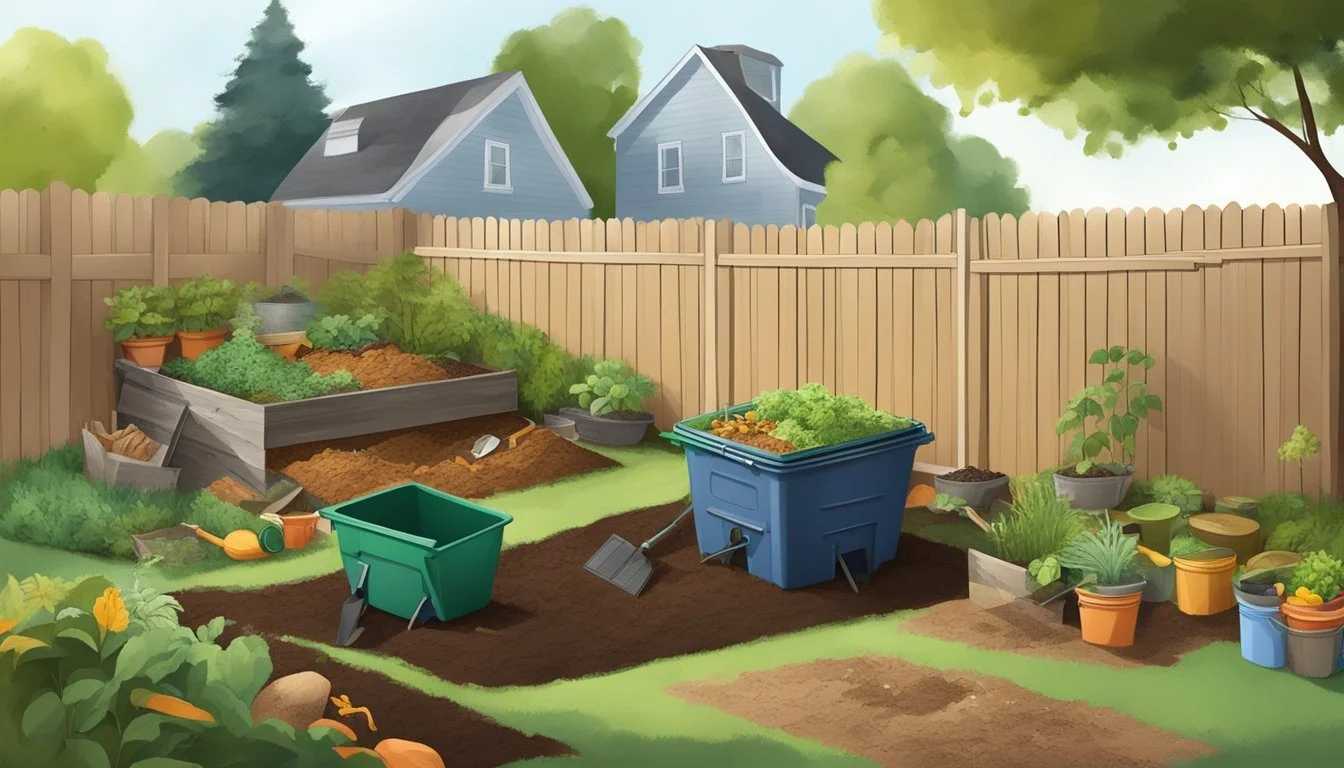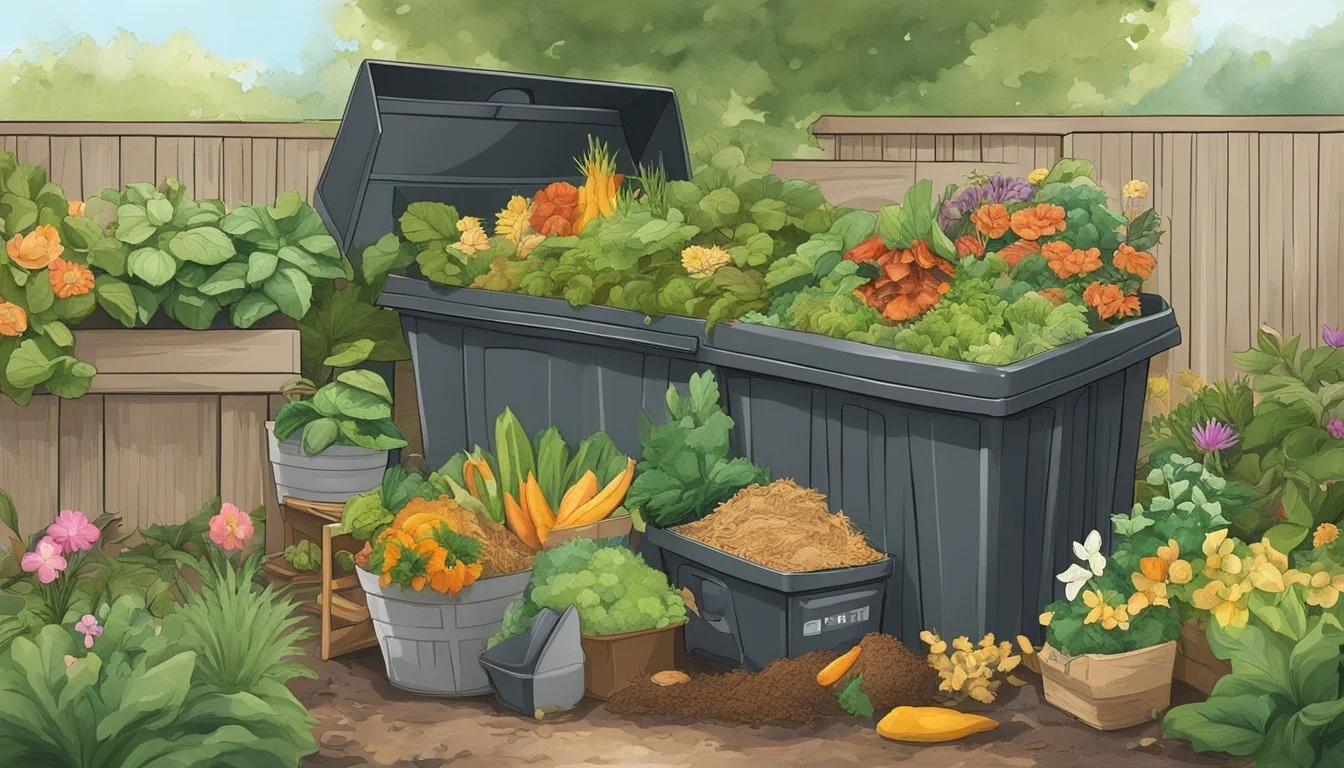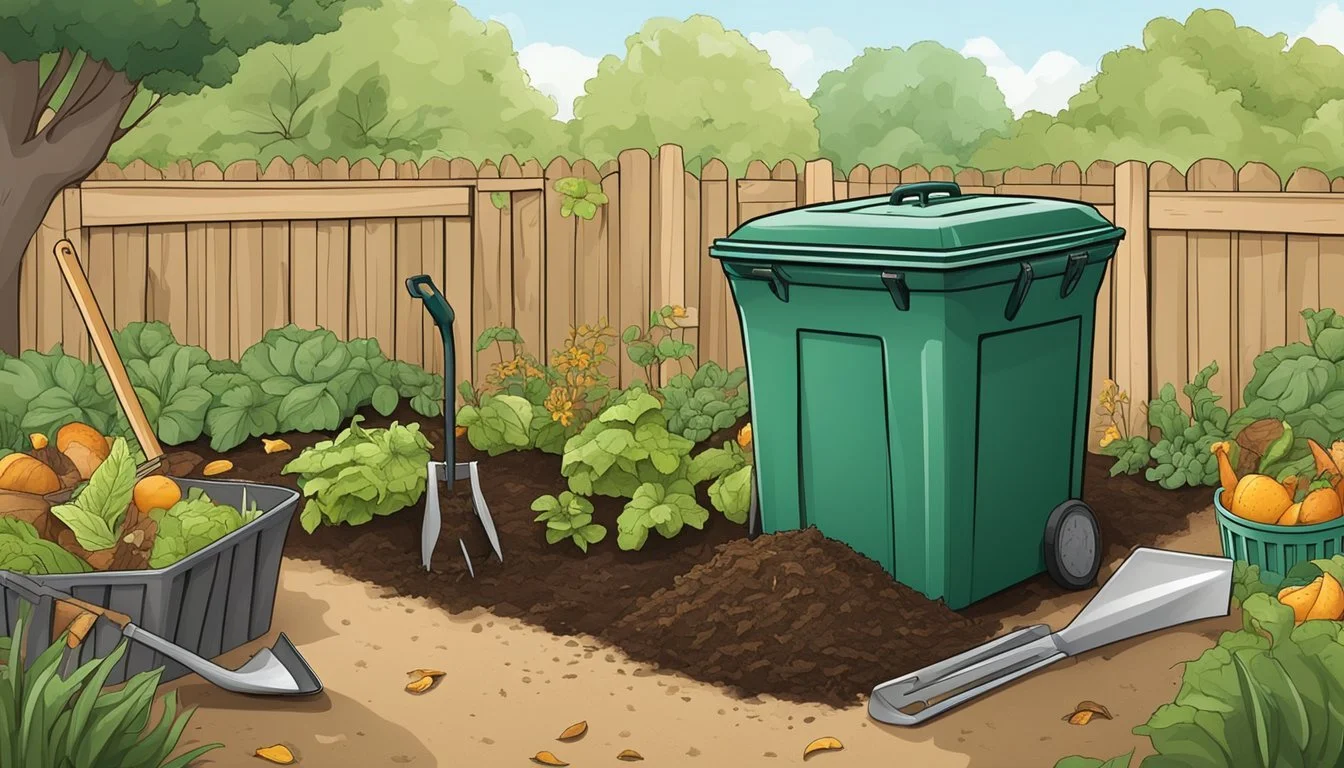Guide to Composting in Fishers, IN
Essential Tips for Local Residents
Composting is an eco-friendly practice that transforms organic waste into a nutrient-rich supplement for soil, designed to promote plant growth and reduce landfill contribution. In Fishers, Indiana, residents have the opportunity to participate in a community-driven effort to embrace sustainable waste management through composting. The city has introduced a Compost Program which advocates for urban greening and environmental responsibility, highlighting the city's commitment to sustainable living practices.
The program provides a means for residents to dispose of their kitchen scraps and yard waste in an environmentally conscious manner. Available year-round at the Fishers Parks Headquarters and seasonally at Fishers AgriPark, the initiative supports locals in their composting endeavors, offering guidance and resources. This action not only aids in reducing the amount of organic waste in landfills but also enriches the soil in the community, making Fishers a greener place to live.
Understanding the basics of composting is essential for success in this endeavor. The process involves balancing green and brown organic materials, maintaining adequate moisture levels, and ensuring proper aeration. The Old Farmer's Almanac provides a comprehensive guide to composting at home, which can be invaluable to residents of Fishers looking to start or improve their composting practices. By partaking in such sustainable activities, individuals contribute to the overall health of the environment and take active steps in fostering a sustainable future for their community.
Composting Basics
In Fishers, Indiana, composting is an eco-friendly method of recycling organic materials, transforming them into nutrient-rich soil, which sustains the environment through natural decomposition processes.
What Is Composting?
Composting is the natural process of decomposition that converts organic materials like leaves, vegetable peels, and garden waste into a nutrient-rich material known as compost. This compost is essentially decomposed organic matter that can be used to enrich soil, thereby enhancing its quality and fertility.
Benefits of Composting
Composting brings multiple benefits to the environment and soil health. Firstly, it reduces the amount of organic waste in landfills, thus lessening methane emissions. Moreover, compost acts as a natural fertilizer, adding vital nutrients back into the soil and improving its structure. By using compost, individuals effectively reduce the need for chemical fertilizers, promoting a more sustainable and healthy ecosystem.
Creating Your Compost Pile
Creating a compost pile in Fishers, IN, provides residents with a sustainable way to recycle organic waste while enriching their gardens. This section addresses the essential aspects needed to establish a successful composting system: location, ingredients, and balancing materials for optimal decomposition.
Choosing the Right Location
A proper location for a compost pile is pivotal. It should be an open, level area with good drainage to avoid any waterlogging, which can suffocate the microorganisms that break down the waste. Accessibility throughout the year is also important, as well as consideration for proximity to your garden and distance from neighbors.
Composting Ingredients and Ratios
The foundation of composting rests on the ratio of carbon to nitrogen in the organic materials. These elements support microbial life, which accelerates decomposition. One should aim for a ratio of approximately 30:1, carbon, to maintain an efficient compounding process without causing greenhouse gas emissions.
Brown materials (high in carbon):
Dried leaves
Straw
Wood chips
Green materials (high in nitrogen):
Grass clippings
Balancing Browns and Greens
Balancing these elements is crucial for a thriving compost pile. Too much nitrogen will lead to a smelly, over-moist pile, while an excess of carbon can slow down the decomposition process. The rule of thumb is to use about two-thirds brown materials to one-third green materials to create an ideal environment for composting.
Maintaining Your Compost
Effective compost maintenance hinges on managing two critical factors: water and air. These elements are essential to fostering the right conditions for organic decomposition. Here's what one needs to know to effectively maintain a compost pile in Fisher, IN.
The Role of Water and Air
Proper moisture levels are crucial for compost health. The materials should feel like a wrung-out sponge—moist to the touch but not soggy. Excessive water can suffocate microbes by displacing oxygen, while too little can halt the decomposition process. As a rule of thumb, strive for your compost to have about 40-60% water content.
Well-ventilated compost ensures that air circulates efficiently throughout the material. Aeration introduces oxygen, which is vital for aerobic bacteria to break down the organic matter. Without sufficient oxygen, the compost can become anaerobic and produce unwanted odors.
Turning the Compost Regularly
Turning the compost is essential for maintaining an even temperature throughout the pile and distributing moisture and air:
How often to turn: Aim to turn your compost approximately once a week.
Best practices for turning:
Use a compost fork or aeration tool.
Mix the materials from the edges to the center.
Ensure that drier material is mixed into moister areas.
Regularly turning the compost helps to maintain the aerobic conditions needed for efficient decomposing, speeding up the process and creating higher quality compost.
Troubleshooting Common Issues
In Fishers, IN, composting can be an effective way to recycle organic waste, but it's not without its challenges. Residents may encounter issues with pests, odors, and climate. The following guidance offers practical solutions for these common composting dilemmas.
Dealing with Pests and Rodents
Pests and rodents are attracted to compost piles because they provide a source of food and shelter. To minimize infestations:
Maintain the proper balance between green (nitrogen-rich) and brown (carbon-rich) materials to discourage pests from taking interest.
Use a compost bin with a lid and secure sides. This barrier can prevent animals from accessing the contents.
Regularly turn the compost to bury food waste and discourage rodents from nesting.
Avoiding Unpleasant Odors
A foul-smelling compost pile is often the result of imbalanced components or poor aeration. To avoid unpleasant odors:
Ensure the carbon-to-nitrogen (C/N) ratio is approximately 25-30:1 to avoid excessive odors.
Aerate the pile by turning it to introduce oxygen, which speeds up the composting process and reduces smell.
Managing the Compost in Cold Weather
Composting during colder months in Fishers, IN, requires attention to maintain activity in the compost pile. Here’s how to manage it:
Insulate the pile with a thick layer of brown materials like dry leaves or straw to retain heat.
In extreme cold, consider a tumbler system that can be turned to keep the compost active even when temperatures drop below freezing.
Composting for Urban Residents
Urban residents in locations such as Fishers, Indiana, have the opportunity to contribute to sustainability efforts through composting—even with limited space. This section will focus on how individuals with outdoor spaces like patios or balconies can effectively manage waste through composting.
Composting on Your Patio or Balcony
Composting in an urban setting requires an understanding of the unique constraints and the best practices to maximize limited outdoor space. For those with a patio or balcony, utilizing a composting bin is an ideal strategy. The City of Fishers offers a program where residents can acquire a 3-gallon composting bin along with 10 compostable liners, which can be a perfect fit for small spaces.
Choosing Your Bin: It is crucial to select a composting bin that fits comfortably on your balcony or patio. The bin should be easily accessible yet not obstruct movement or leisure activities.
Utilizing Compostable Liners: Compostable liners help maintain cleanliness and order in your composting bin. These should be replaced when full and are typically designed to break down within the compost pile.
For Fishers residents interested in starting this sustainable practice, more details are available through Fishers Parks Composting Program. With these tools and a little dedication, anyone can transform their kitchen scraps and plant matter into valuable compost, even in an urban environment.
Community and City Initiatives
Fishers, IN, is proactive in fostering sustainable practices through diverse programs. These initiatives are designed to encourage residents to participate in composting and gardening, contributing to a greener community.
Fishers Community Garden Programs
The City of Fishers offers a Community Garden Program where local residents can engage in gardening activities, which also supports composting efforts. Fishers residents are provided with the necessary resources to take an active part in cultivating their gardens, thus promoting local, sustainable food production and waste reduction.
Fishers AgriPark Composting Program
At Fishers AgriPark, there is a robust composting program offering free composting bins and liners to Fishers residents. This initiative not only provides the tools needed for effective composting but also educates the community on the benefits of turning organic waste into nutrient-rich compost, which can then be used to enrich the soil within Fishers parks and individual gardens alike.
Gardening with Compost
Gardening enthusiasts in Fishers, IN, understand the immense benefits that compost brings to their gardens. This natural soil amendment enriches the soil, promoting healthier plant growth throughout garden spaces.
Enriching Your Soil with Compost
Using compost in a garden is a powerful way to enhance the quality of soil. Compost is a culmination of decomposed organic matter, such as yard waste and vegetable scraps, which becomes a nutrient-rich substance. Gardeners can integrate compost into their soil to boost fertility without the use of chemical fertilizers.
Improve Soil Structure: Compost helps to bind soil particles, especially in sandy or clay soils, which allows for better water retention and air circulation. This makes the soil more conducive to plant root growth.
Nutrient Supply: Compost gradually releases essential nutrients, including nitrogen, phosphorus, and potassium, which are vital for plant health.
Natural Fertilizer: Unlike synthetic fertilizers, compost provides a slow release of nutrients over time, reducing the risk of over-fertilization.
In Fishers, composting programs such as the one offered by Fishers Parks & Recreation make it easy for residents to contribute their organic household waste and later utilize this compost for their own gardens. By participating in this program, gardeners can decrease their environmental impact while improving their garden's productivity.
To incorporate compost into garden soil, one should:
Spread a 2 to 3-inch layer of compost over their garden beds.
Work the compost into the top 6 to 8 inches of soil before planting.
For potted plants, use a mix of up to 30 percent compost with potting soil to ensure proper drainage and nutrient availability.
By enriching their soil with compost, gardeners in Fishers can help their plants grow more vigorously and produce more abundant yields in their garden. Whether one is maintaining ornamental flower beds or growing a vegetable garden, compost is the cornerstone of a healthy and sustainable garden ecosystem.
Advanced Composting Techniques
Advanced composting techniques take advantage of specific biological processes to enhance and accelerate the decomposition of organic waste, transforming it into valuable soil amendments. These methods can be particularly efficient for individuals looking to compost in a more controlled, scientific manner.
Vermicomposting: Worms at Work
Vermicomposting involves the use of worms, especially red wigglers, to break down organic matter. Fishers, IN residents can harness this powerful natural process by maintaining a worm bin where microorganisms and worms work in synergy to decompose kitchen scraps and small amounts of yard waste. The end product, known as worm compost or "worm castings," is a nutrient-rich, natural fertilizer that plants love. When setting up a vermicomposting system, include a mix of "browns" like shredded paper for carbon and "greens" like vegetable peels for nitrogen. Ensure adequate moisture and aeration for the worms' optimal activity and digestion.
Bokashi: Fermenting Your Waste
Unlike traditional composting methods, Bokashi composting is an anaerobic process that ferments organic waste, including items often avoided in standard composts, such as cooked foods and meats. This method relies on inoculated bran to introduce beneficial microorganisms that ferment the waste. The result is a pre-compost that can then be buried in the soil to complete the decomposition process. Bokashi bins can be kept indoors with minimal odor, making this an appealing option for Fishers residents without large yards. This method is quick, often taking only a few weeks to produce the fermented material ready for soil integration.
Reducing Waste Beyond Composting
While composting is a valuable practice in Fishers, residents have additional methods at their disposal to further minimize waste. These strategies emphasize the importance of recycling and managing food waste more efficiently.
Home Recycling Tips
Residents in Fishers can contribute to a greener environment by adhering to effective recycling practices. An essential step involves knowing what materials are recyclable in your local community. Items typically include paper, cardboard, plastic bottles and containers, glass bottles, and metal cans. Consider the following guidelines:
Sort Wisely: Separate recyclables from trash to avoid contamination.
Clean Contaminants: Rinse bottles and containers to remove residue.
Know Your Plastics: Not all plastics are recyclable. Check the recycling symbol and number on the bottom of the container.
Simple actions such as breaking down cardboard boxes save space in recycling bins and ensure that materials are processed correctly by recycling facilities.
Cutting Down Food Waste at Home
Food waste is a significant contributor to landfills, but it can be mitigated through mindful consumption and storage practices. Here's how Fishers' residents can cut down on food waste:
Plan Your Meals: Buying only what is needed reduces the amount of unwanted or unused fruit and vegetables.
Understand Expiration Dates: Often, food is still safe to consume after a "best by" date, which can prevent premature disposal of edible items.
By following these steps, individuals help reduce the load on local composting facilities and incinerators, leading to a more sustainable future for the Fishers community.
Education and Resources
Fishers residents have access to a variety of educational resources on composting, ensuring they can gain the knowledge needed to start and maintain their composting efforts effectively.
Learning More Through Workshops and Videos
Workshops: Residents of Fishers can enhance their composting knowledge by attending available workshops. The Fishers Parks & Recreation provides free composting workshops tailored to help individuals understand the basics of composting, the benefits it brings, and the details of setting up their own compost systems at home.
Informational Videos: For those who prefer learning at their own pace, a selection of composting instructional videos can be found on various platforms. These videos often cover a slew of topics, from garden composting techniques to troubleshooting common composting problems.
Newsletters: Awareness and continuous learning can be supported through regular newsletters from environmental health organizations or local initiatives. Newsletters may include updates on composting programs, seasonal tips, and advanced techniques to enhance composting practices.
Online Resources: Extensive composting information and resources are also available through the IDEM: Community Environmental Health: Composting page, where individuals can find comprehensive guides that can transform a novice into a knowledgeable composter, contributing to the community's environmental health initiatives.
Conclusion
Composting in Fishers, IN represents a proactive step towards mitigating climate change impacts. By engaging in composting practices, residents have the opportunity to reduce the amount of waste reaching landfills, cut down methane emissions, and produce nourishing soil amendments for gardens and landscapes.
Fishers Parks & Recreation offers a Compost Program that exemplifies the community's dedication to sustainability. Residents can participate by disposing of organic material such as food scraps and yard waste, which are transformed into compost.
The importance of composting extends beyond waste reduction. It directly contributes to soil health, making it a potent ally in the fight against climate change. By enhancing the soil’s ability to capture carbon through compost application, Fishers residents can play a critical role in carbon sequestration efforts.
Various local initiatives, such as the Keep Fishers Beautiful campaign, also encourage sustainable practices by offering incentives like free compost tumblers for residents taking environmental pledges.
With each contribution to composting, the community of Fishers, IN forms part of a larger movement towards environmental stewardship, showcasing that small, collective actions lead to significant environmental benefits. This concerted effort not only aids in reducing greenhouse gas emissions but also exemplifies Fishers' commitment to a healthier, more sustainable future.



